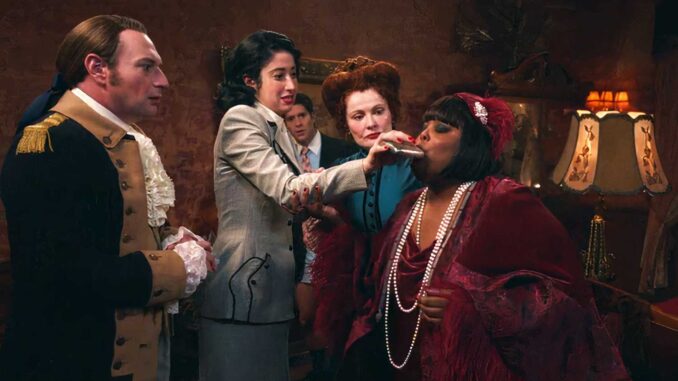
The Familiar Laughter: Why the Absence of Thomas Thorne in the Ghosts Finale Paved the Way for a Season 5 Triumph
The grand ballroom of Button House stood shimmering, a testament to centuries of lives lived and stories whispered. Season 4 of "Ghosts" had culminated in a breathtaking crescendo, a ballet of past and present woven together by the heartwarming bonds of the living and the lingering. Yet, amidst the jubilant festivities, a subtle absence gnawed at the edges of the scene – the absence of Thomas Thorne, the hopelessly romantic poet, the embodiment of longing and unrequited love. His empty chair, a void amongst the spectral gathering, left fans with a question that resonated long after the credits rolled: why was Thomas missing, and, more importantly, what did it portend for Season 5?
The brilliance of "Ghosts" lies in its ensemble cast, each character a uniquely flawed and endearing mosaic piece contributing to the vibrant tapestry of Button House. Thomas, with his flamboyant declarations of love and his tragically unfulfilled desires, holds a special place in the hearts of many. He is the walking, talking embodiment of romantic idealism, a stark contrast to the pragmatic and often cynical world that surrounds him. His absence in the finale, therefore, felt like a deliberate statement, a carefully orchestrated narrative choice designed to amplify the anticipation for the season to come.
One could speculate about the possible reasons for Thomas's disappearance. Perhaps he was experiencing a particularly acute bout of unrequited love, the despair so profound that it rendered him invisible even to his fellow ghosts. Perhaps he was grappling with a deeper existential crisis, forced to confront the futility of eternal yearning. Or, more intriguingly, perhaps he was on a spectral journey of his own, seeking solace or answers beyond the familiar walls of Button House.
The writers of "Ghosts" are masters of misdirection, skillfully weaving humor and pathos into a complex narrative web. By removing Thomas from the finale, they ignited a fire of speculation amongst fans. Online forums buzzed with theories, each more imaginative than the last. This strategic absence served to not only create suspense but also to highlight the importance of Thomas's character within the ensemble. His presence is so integral to the dynamic of the house that his absence is immediately felt, a palpable void that disrupts the established harmony.
The potential for Season 5 is now bursting with possibilities. Will Thomas return transformed, having confronted his inner demons and perhaps even found a modicum of peace? Will his absence have a ripple effect on the other ghosts, forcing them to re-evaluate their own relationships and desires? Will the reason for his disappearance be a source of comedic gold, or will it delve into the deeper, more melancholic aspects of his character?
The beauty of "Ghosts" is its ability to blend the absurd with the profoundly moving. The finale, despite its celebratory tone, hinted at a darker undercurrent, a sense that the ghosts, despite their seemingly idyllic existence, are still trapped in their own personal purgatories. Thomas's absence underscores this idea, reminding us that even in a world of eternal companionship, individual struggles can lead to isolation and a longing for something more.
Thus, the fan favorite's conspicuous absence in the Season 4 finale is not simply a cliffhanger; it is a narrative promise. It promises a deeper exploration of Thomas Thorne's character, a journey into the heart of his romantic idealism and his eternal quest for love. It promises a season filled with the familiar laughter that only Thomas can elicit, coupled with a newfound understanding of the complexities that lie beneath his flamboyant exterior. It promises, in short, a Season 5 that will be all the richer and more poignant for the carefully crafted absence of one of Button House's most beloved residents. We can only hope that when the curtain rises on the next chapter, Thomas will be standing there, quill in hand, ready to regale us with tales of love, loss, and the eternal search for connection, reminding us that even in the afterlife, the human (or ghostly) heart never stops yearning.